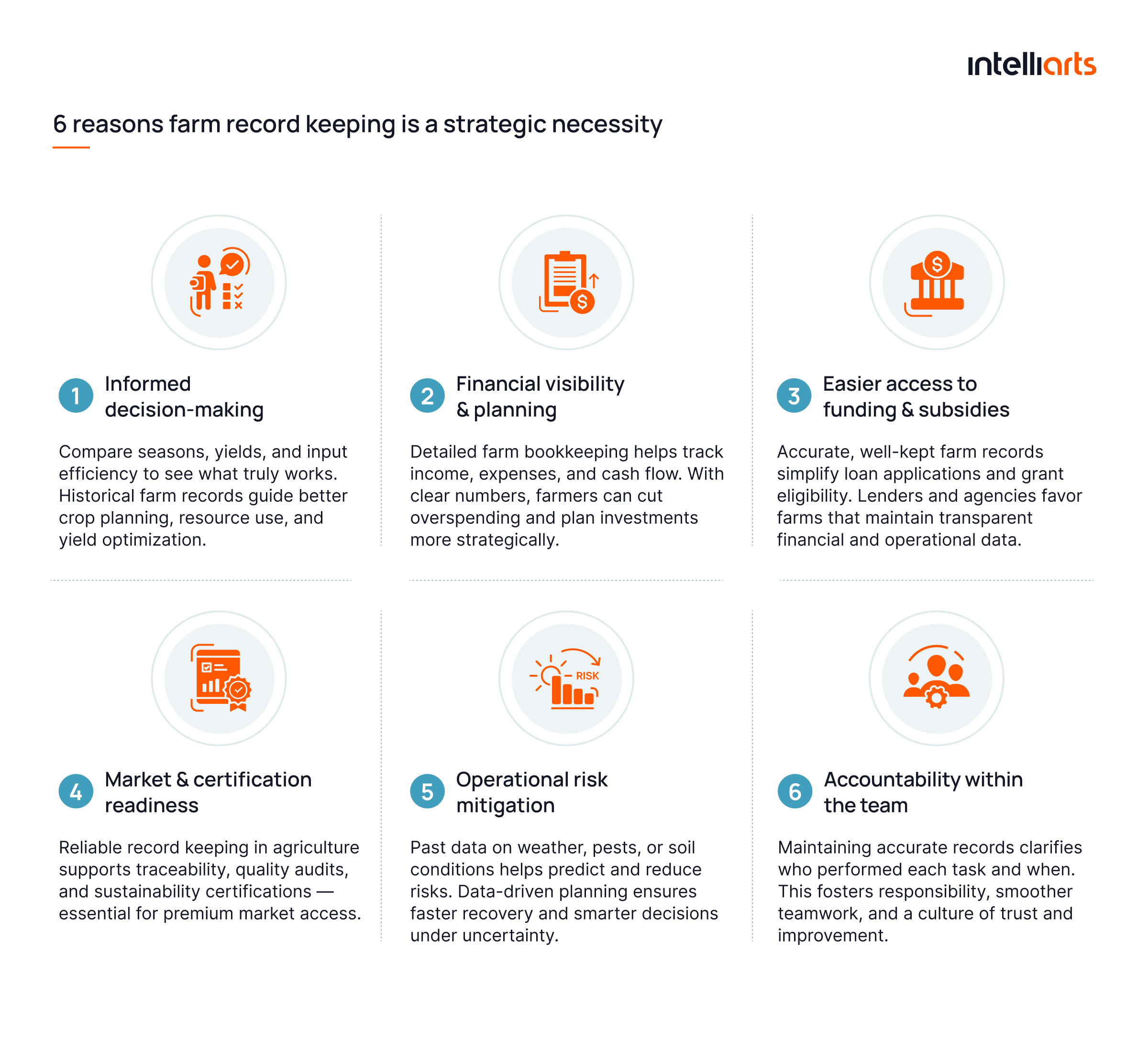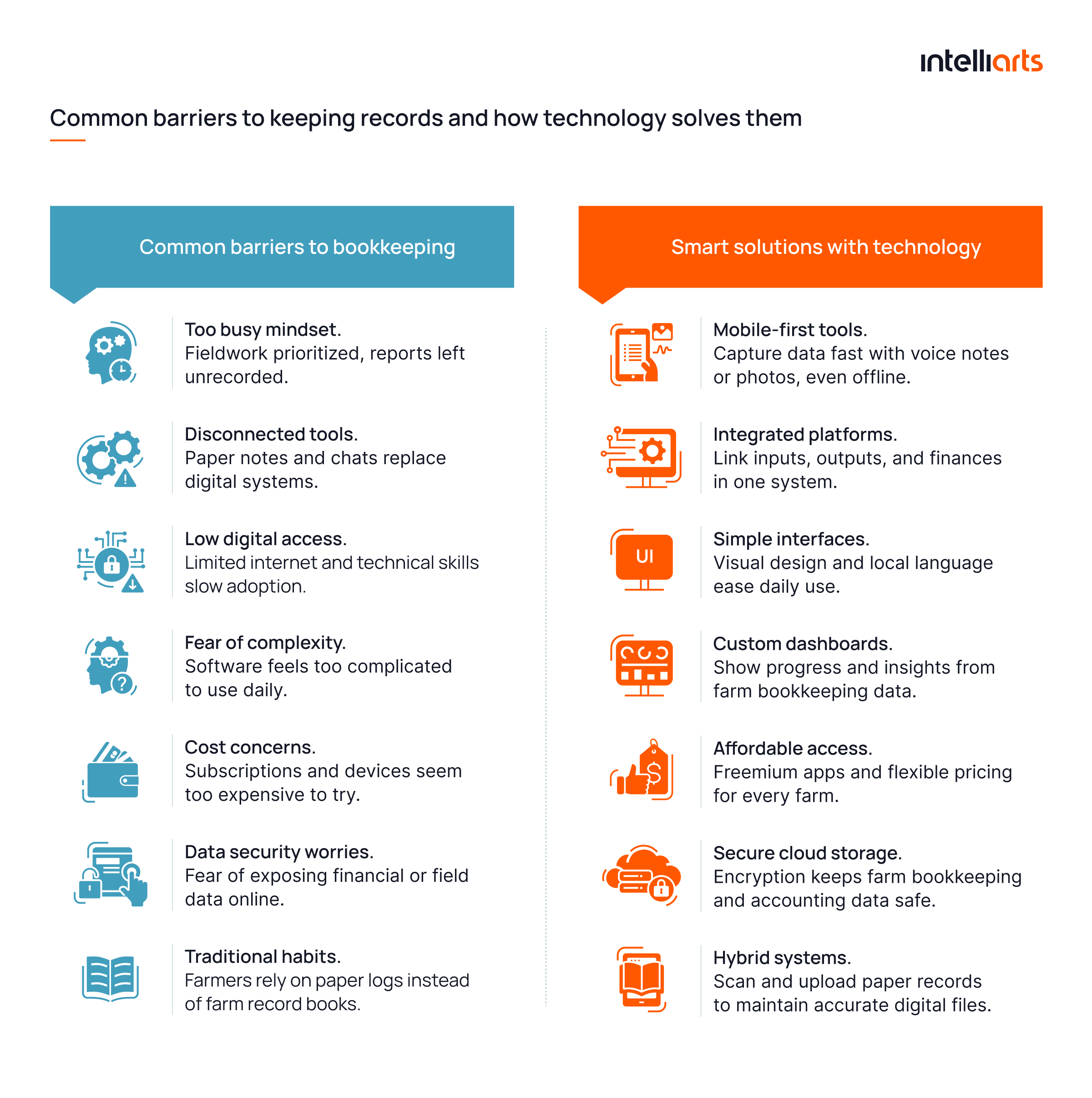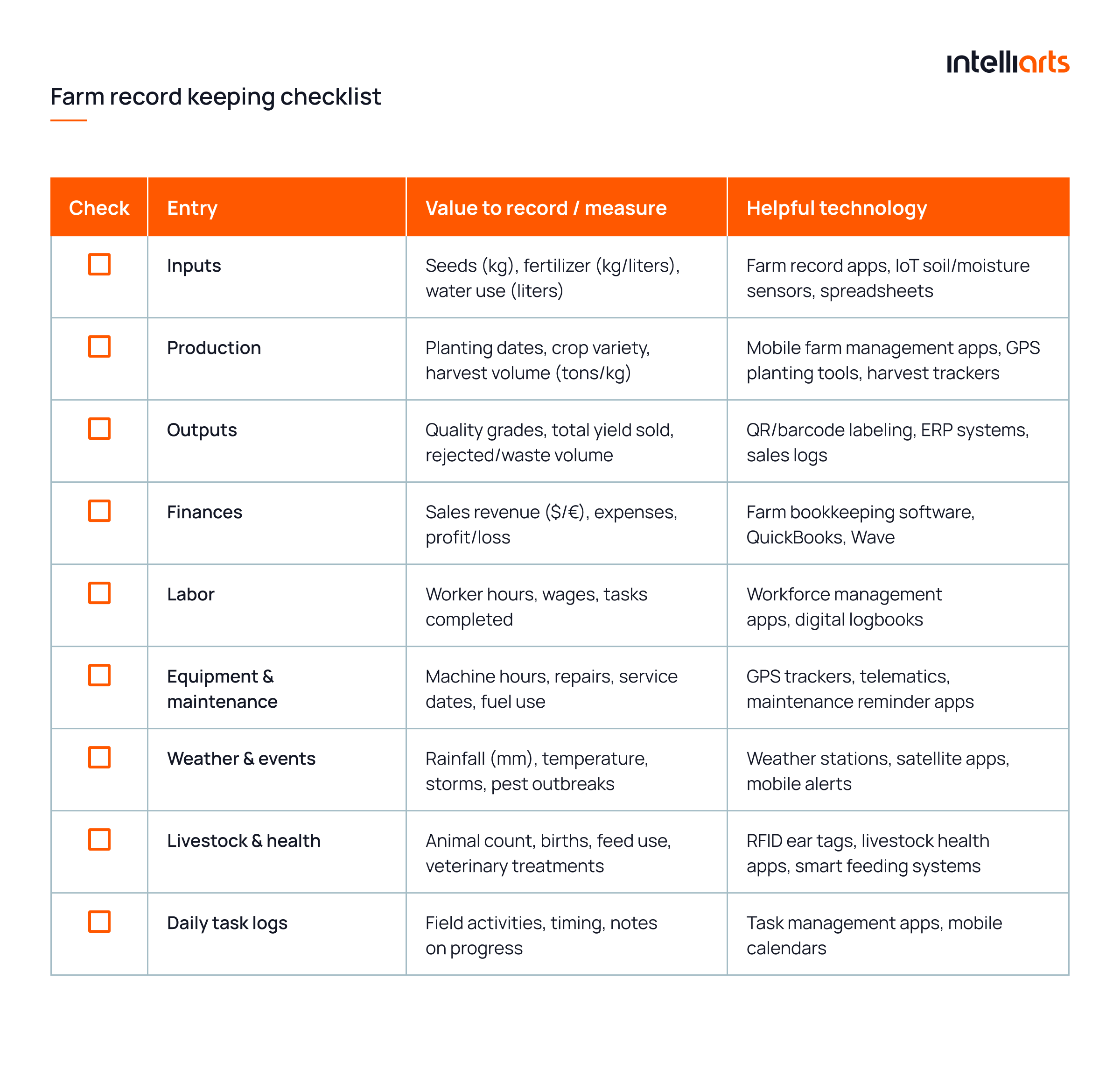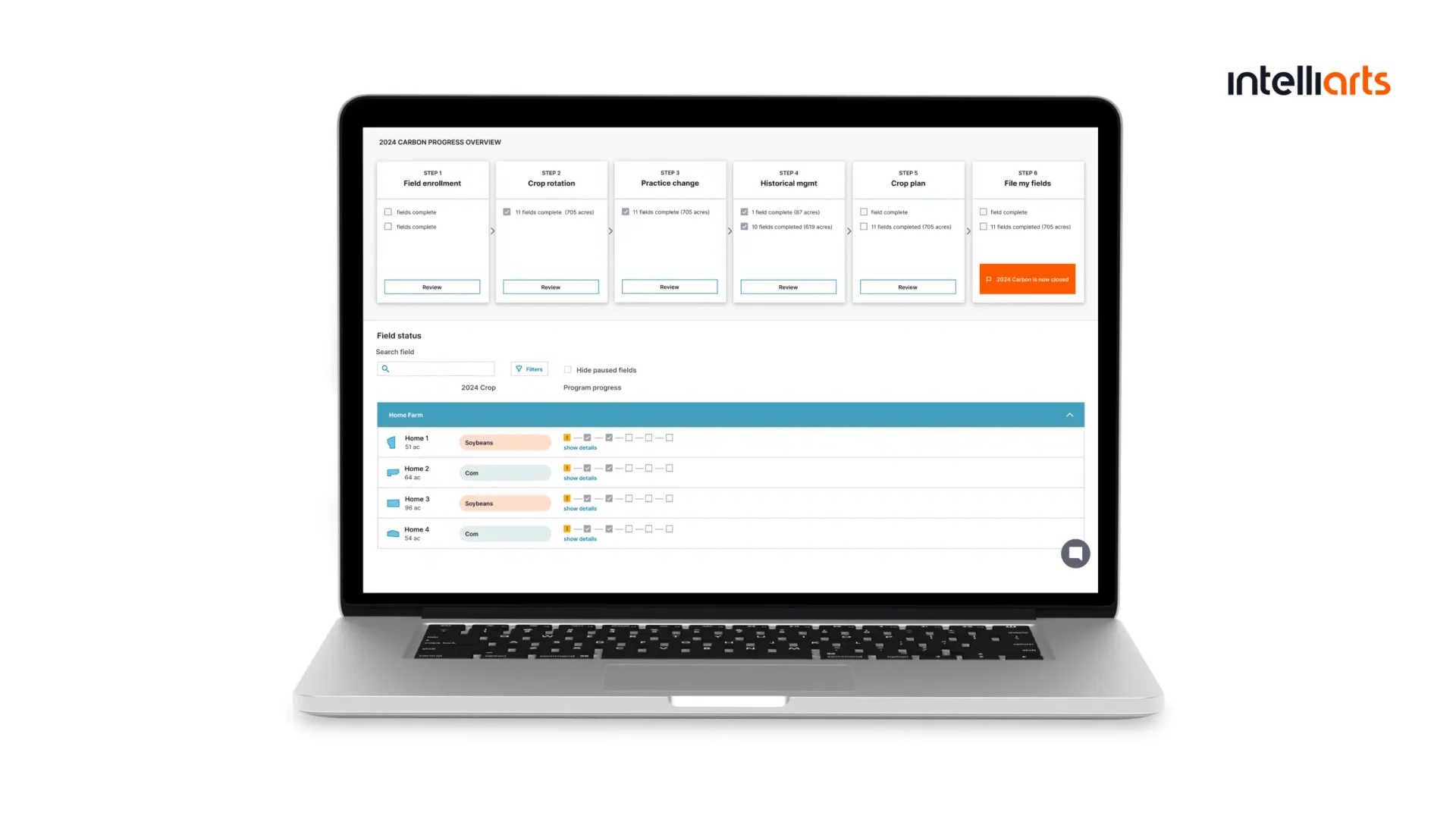In a field trial in Japan, legacy farm machinery retrofitted with low-cost IoT/GNSS devices generated 1,623 automatically recorded work records in seven months. Another research report on farm record keeping states that 63% of farmers say they use farm software in some part of their operations. Digitalization is here, and farm bookkeeping is just another part of it.
In this post, you’ll find out what farm records are and why bookkeeping is strategically necessary for an agricultural business. Besides, you’ll learn common barriers to bookkeeping adoption and how technology solves them. Finally, you’ll explore digital software used in farm record keeping.
What are farm records, and what do they actually include?
Farm records are organized documents or digital files that capture information about farming activities, such as inputs, outputs, finances, equipment, and labor.
Basically, records serve as a farm record book of daily operations, which helps farmers track performance, manage costs, and make informed decisions for future production.
Are you asking yourself what data you should be gathering for agricultural purposes? After all, detailed field data is often composed of 3-5 years of historical data records. Using our experience with farming companies, the Intelliarts team has gathered the most useful entries for record keeping. Find the simple checklist below:
Note: Depending on the scale of your business and the level of digitalization, you may consider sticking to only a few key values to record and an Excel spreadsheet. Alternatively, having a dedicated custom software that can aggregate all the mentioned data types can offer a better performance as well as a foundation for further analytics.
Explore our success story on automating data entry published on the respective portfolio page.
Why farm record keeping is a strategic necessity
What is the main reason for keeping accurate records? In today’s data-driven agriculture, keeping farm records is about managing knowledge, rather than dealing with additional paperwork. Such intervention can offer a clear edge in productivity and resilience.
Find clear reasons to get started with farm record-keeping in the infographics below:

Looking to centralize your farm’s data across multiple systems and formats? Let’s discuss
Common barriers to keeping records and how technology solves them
It’s frequent when both small and large-scale businesses refuse to adopt a technology innovation for different reasons. Here are the most common barriers to getting started with bookkeeping in agriculture that the Intelliarts team has noted.
Key barriers to bookkeeping adoption
- “Too busy” or “I’ll remember it” mindset. Some farmers see fieldwork as the priority, so details about inputs, sales, or labor go unrecorded. Over time, this habit undermines the importance of record-keeping for decisions and compliance.
- Disconnected tools. Notes in a farm record book, WhatsApp chats, and Excel sheets are scattered, making it hard to get a full picture of farm operations. This slows down analysis and reporting.
- Low digital access or literacy. Sometimes, farmers may lack internet access or confidence using digital systems for farm record keeping, leaving them dependent on paper-based records.
- Fear of complexity. Farm bookkeeping may be intentionally avoided because workers find software solutions to be too technical, costly, or time-consuming to use effectively.
- Cost concerns: Development expenses, subscription fees, and device costs make companies hesitate, especially when traditional examples of farm records (paper receipts, notebooks) feel cheaper to use.
- Trust & data security worries. Companies may be concerned about storing sensitive financial and farm bookkeeping and accounting information online.
As you can observe, most barriers are created by the urge to maintain traditional approaches in farming and the fear of change. This is especially critical for smaller-scale agriculture businesses. As for large companies, they are mostly concerned about the general connectivity of software in use and the security of data transferring and storing.
Smart solutions to bookkeeping adoption barriers
Over the 25 years of delivering software solutions, the Intelliarts team has tested numerous technological approaches to actual business issues. While we can confirm that a standalone software is rarely a solution to a complex business situation by itself, a mix of carefully selected and developed options can aid a lot.
Here are some of the smart solutions or properties of software we consider useful in overcoming barriers described above:
- Mobile-first, offline-friendly tools: Separate apps or additional software features with quick-entry fields, photo uploads, and voice notes let farmers capture data on the go. Such solutions may work even without the internet.
- Integrated platforms: All-in-one systems link inputs, outputs, and financials in one place. This solves the problem of scattered farm records and ensures the maintenance of accurate records over time.
In one of our projects, Intelliarts implemented software integrations, automating data entry, to cut time from hours to minutes.
- Simple, visual interfaces: Intuitive design and local-language support in apps lower the learning curve, this way helping to overcome fear of complexity and reluctance.
- Custom dashboards & flexible UIs: Tailored views help managers utilize analytical methods, which fulfill the main purpose of having bookkeeping software in place.
- Affordable access models: Freemium apps, pay-as-you-grow plans, and community licenses help to get started with digital farm bookkeeping for even smaller-scale farming businesses.
- Secure cloud storage: Encryption and permissions protect sensitive data. This reassures agricultural businesses that farm bookkeeping and accounting records remain safe and private.
- Hybrid systems: Tools that scan and upload receipts, ledgers, or examples of farm records bridge traditional practices with modern efficiency. Such solutions make the transition smoother.

How digital tools transform farm record keeping
Now we know what smart software and technology features are needed to overcome barriers to keeping farm records. As a follow-up, let’s review several types of exact software and technology tools, which can have such properties, to consider using.
#1 Farm management apps (mobile/web)
Modern farm management apps centralize operational data into one digital workspace. They enable quick logging, planning, and analysis across devices.
Examples of apps:
Take a look at the agritech sensor inventory management case study by Intelliarts on our respective portfolio page.
How it’s used: Farmers can record input use, assign field tasks, and analyze yield results in real time. For instance, they might plan irrigation schedules, monitor expenses, and compare productivity across fields.
#2 Dashboards and alerts
Dashboards consolidate diverse farm metrics, such as soil moisture, crop health, or equipment performance, into visual, interactive displays. Alerts highlight deviations or risks before they escalate.
Examples of apps:
How it’s used: A farmer can receive instant alerts about pest threats or machinery downtime. By tracking weather, fertilizer use, or fuel consumption, dashboards enable predictive, data-driven adjustments that save both time and resources.
#3 Analytical software
Analytical tools apply data science and spatial mapping to uncover patterns in yields, costs, and resource efficiency. They turn raw records into insights for future planning.
Examples of apps:
How it’s used: By analyzing five years of yield data, a farmer can see how soil zones and rainfall affect output. Insights support smarter seed selection, optimized input timing, and better financial negotiations with suppliers.
#4 IoT & sensors for auto-logging
IoT sensors automate data collection across soil, livestock, and machinery. Continuous readings are sent directly to farm software, minimizing manual entry errors.
Examples of apps:
How it’s used: Soil sensors log temperature and moisture automatically, while livestock trackers monitor movement and feeding. This way, farmers gain instant visibility into conditions.
#5 Integration with weather & satellite data
Integration tools combine on-farm data with external sources like weather forecasts and satellite imagery, enriching decision-making with environmental context.
Examples of apps:
How it’s used: A grower might delay spraying due to forecasted rain or detect stressed crop zones from NDVI maps.
#6 Finance tools
Agricultural finance platforms connect operational data with accounting systems, simplifying profitability tracking, reporting, and compliance.
Examples of apps:
How it’s used: Farmers automatically sync field expenses, labor costs, and revenues into financial dashboards. This supports informed decisions on investments or subsidies.
Read additionally about AI in agriculture in another blog post by Intelliarts.
Important note: As you can see, the range of software recommended for usage is extensive. However, with development assistance, example apps as well as custom features can be aggregated within one platform. This would offer an all-in-one digital space for all
Here at Intelliarts, we have substantial expertise in the agriculture domain. We can cover the entire range of software engineering services, and offer you both custom farm bookkeeping software as well as integration of AI, GIS, IoT, management, analytics, or other conventional and LLM functionalities in your system. The next section reveals one of many case studies in our portfolio.
Automated field data collection in agritech: Success story by Intelliarts
Challenge: The agritech company Indigo aimed to scale its carbon farming program but faced major barriers in data collection. Growers were required to submit 3–5 years of historical field data, which was often incomplete, inaccurate, or time-consuming to gather. Manual workflows slowed onboarding and limited participation among farmers.
Solution: Intelliarts built a lightning solution that integrates remote sensing, machine learning, and the customer’s Best Guess API to automate data collection and pre-fill grower records. The system inferred key agricultural data like crop type, planting dates, and field boundaries. Main efforts were focused on avoiding manual entry and simplifying farm data collection across programs.
Results: The automation cut record-keeping time from weeks to hours, improving data accuracy and grower experience. The company achieved a 3× increase in enrolled acres (2.6M+ across the U.S.), generated over 1M carbon credits, and reached 80% grower retention. This notably strengthened the company’s position in sustainable agriculture and digital farming innovation
Take a look at our success story on field data collection to find out how smart solutions can help with farm records in greater detail.
Final take
Today, digital tools have reshaped farm record keeping into a foundation for smarter management. Through connected apps, sensors, and analytics, farmers gain clear insight into operations and finances. Accurate, integrated records now support better planning, sustainability goals, and profitability, which makes digital record keeping a vital part of running a modern, resilient farm business.
The Intelliarts team is a trusted provider of development services in the agricultural domain. With over 80 large projects complete, 54% of senior staff engineers, and a 90% customer return rate, we are ready, willing, and able to assist you with the integration of a farm record keeping system.
FAQ
What is the primary purpose of record keeping?
The main reason for record keeping is to accurately track income, expenses, and other financial details to support information reported on tax returns. Proper farm bookkeeping helps verify deductions, monitor business progress, and provide documentation in case of an Internal Revenue Service (IRS) audit.
Why is record keeping important in agriculture?
In agriculture, record keeping is vital because farming is a business. Accurate farm records help monitor production costs, measure profitability, and guide better decision-making for future planning, budgeting, and resource use. They also provide evidence for loans, insurance, and government programs.
How can agricultural records help an agribusiness manager?
Agricultural records help managers analyze past performance to make smarter decisions. By tracking planting schedules, input costs, and yields, managers can plan ahead, forecast cash flow, and improve efficiency. Good records answer the question: “How can agricultural records help an agribusiness manager?” by supporting risk management and long-term growth strategies.














